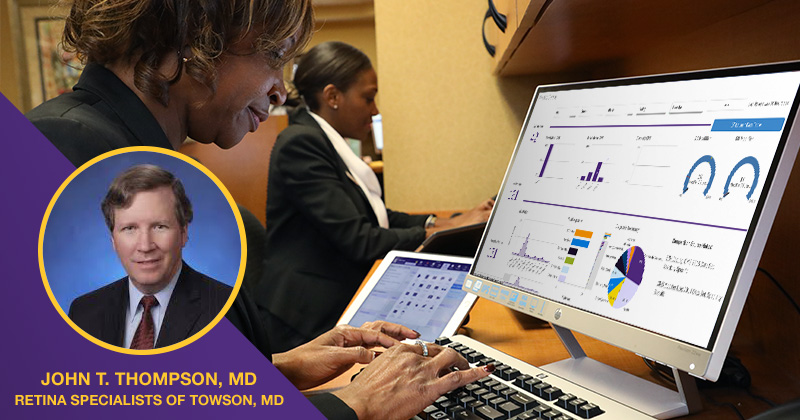Accessing and Sharing Critical Patient Data

The improved data processing capabilities of today’s ophthalmology EMR systems mean important data is no longer being held hostage.
This was a sponsored post by Modernizing Medicine and originally appeared in Ophthalmology Management.
Like any other ophthalmologist, I rely on data to help me take better care of my patients. For example, as a retina specialist, I use data to help me track the progress of certain patients, such as who have undergone macular hole surgery or retinal detachment repair.
Data also helps me identify specific populations of patients — e.g., those with diabetes, or those taking certain medications, such as Plaquenil, a drug that can cause retinal toxicity — allowing me to watch for a particular condition or drug-related complications.
From a business perspective, I rely on data from the ophthalmology software to measure important metrics, such as the number of new patients, percentage of return patients, and percentages of procedures for particular conditions, to track patient activity in the practice.
Finally, I rely on data to help me track our MIPS quality measures, so I can demonstrate to the Centers for Medicare and Medicaid Services (CMS) that we’re delivering high-quality care. In many ways, this is the most important reason I rely on data, because it has significant economic consequences on our practice with respect to CMS bonuses for meeting the measures or penalties for failing to meet them.
I’d wager the same is true for your practice.
New Ophthalmology EMR Systems Offer Major Advantages
Fortunately, companies are starting to move the chains with respect to the data processing capabilities of ophthalmology electronic medical records (EMRs).
One aspect I find most valuable about our EMR system, EMA™, designed specifically for ophthalmology by Modernizing Medicine®, for instance, is its analytics module, which provides multiple standard reports, including one for quality reporting-related data. Modernizing Medicine has already done all the programming that enables us to extract the data used by CMS to judge the quality of our care and issue bonuses accordingly.
Moreover, we can tell, in real time, how we’re doing in such areas as evaluating the optic nerve for glaucoma or returning to the operating room after retinal detachment repair. This is a major advantage at a time when CMS requires full-year quality measures; we have time to course correct if we fall short on a particular measure. Some of the external registries don’t permit instant download or analysis of the data, and feedback may not be available for 3 — or even 6 — months, which is a serious drawback.
Standardized Reports Allow for Key Benchmark Measurements
My ophthalmology EMR system also offers standardized reports that can tell me, for example, our most common diagnoses and procedures. This is useful for measuring key benchmarks on the health of a practice.
I also find it especially beneficial that it can drill down to particular subsets of patients. For example, with a few clicks, I can view all patients who have bullous retinoschisis or patients between the ages of 61 and 80 years old with rubeosis iridis. This allows me to identify subgroups of patients for clinical research or those who may benefit from a new treatment.
Critical Data At Our Fingertips
If you stop and think about it, most ophthalmology EMR systems hold patient data hostage. We enter all this data, yet the only way to share it is to send faxes to our patients’ other doctors about their latest examination. Even then, these faxes are geared primarily toward input and output of a single patient examination on a particular date.
Ophthalmology EMR systems should be capable of much more, and thanks to today’s emerging systems, the days of EMR systems holding data hostage are finally coming to an end.





